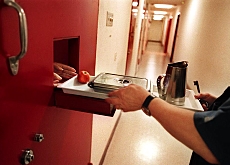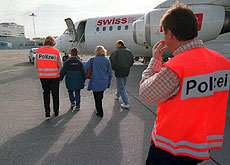UN turns spotlight on Swiss detention policy

The United Nations Committee against Torture has questioned Switzerland about possible risks in the domain of detention, particularly concerning asylum.
The ten-strong committee also raised concerns about draft legislation defining the use of electroshock weapons during forced repatriations.
On Monday a Swiss delegation in Geneva finished a two-day presentation of the country’s fourth report on how it is complying with the UN Convention on Torture.
The report covers a range of issues from asylum and forced deportations through to the rights of people in police custody and the transportation of prisoners in Switzerland.
Claudio Grossman, Chile’s representative on the committee, told the hearing that he was concerned about new legislation on forms of restraint that could be used by the Swiss authorities to subdue prisoners.
Complaints
Grossman also asked the Swiss delegation to explain why the number of complaints of torture or cruel treatment was on the rise in several Swiss cantons.
The head of Geneva’s police, Urs Rechsteiner, said the rise was linked to large violent demonstrations, such as that against the meeting of the Group of Eight countries, during which even simple identity checks could turn sour.
The draft law lists several types of shackles and handcuffs, electroshock weapons and batons that would be allowed as a last resort.
The committee insisted that their use – if approved – should be subject to strict guidelines.
Egypt’s Sayed El Masry pointed out that such weapons were considered instruments of torture in many countries.
Constructive
Bernardo Stadelmann, vice-director of the Federal Justice Office, told swissinfo that the meeting with the UN committee had been constructive and that the delegation had been able to cover most of the points raised by members.
“The committee highlighted the good example that Switzerland is setting in the international community concerning the respect of the Convention on Torture, and also in all matters of defence of democratic and human rights,” he said.
“We were able to answer all their questions and they were satisfied with our answers. There aren’t any particular problems or important questions that have been left open.”
Stadelmann said the Swiss had told committee members that no decisions had been taken on individual weapons and forms of restraint that could be used in future to subdue prisoners.
But he insisted that any measures approved by parliament would conform to international human-rights law.
Very concerned
“The committee told us they were very concerned about future developments in legislation in Switzerland concerning integration and foreigners, and they expressed their wish that the tradition in respect of humans rights in our country should be kept alive,” he said.
The Swiss branch of Amnesty International said it was disappointed that the committee had not been more critical of Switzerland, particularly over asylum issues.
“The current situation has been painted in a positive way by Switzerland but in reality this is not the case,” said refugee coordinator Denise Graf.
She said the committee had failed to pick up on the proposed tightening of the country’s asylum law and the use of private security agencies in asylum centres.
Graf said she hoped the committee would take a stronger line when it issued its recommendations later this month.
swissinfo
Switzerland ratified the UN Convention against Torture in 1986.
The Swiss presented their previous report to the committee in 1997.
Under the Swiss bill, use of handcuffs, shackles and bindings would be permitted during forced repatriations.
In emergency cases, electroshock weapons and batons would also be allowed.
Helmets and gags would not be permitted.
Some methods of detention and tranquillising drugs would be banned.
At least two men have died in Switzerland during their forced deportation.
In 1999, a 27-year-old Palestinian who was scheduled to fly to Cairo, suffocated at Zurich airport. To stop him screaming, police taped his mouth, although he had breathing problems.
In 2001, a 27-year-old Nigerian died in a detention centre in Granges in canton Valais. The autopsy concluded that the cause of death was also suffocation.

In compliance with the JTI standards
More: SWI swissinfo.ch certified by the Journalism Trust Initiative


You can find an overview of ongoing debates with our journalists here . Please join us!
If you want to start a conversation about a topic raised in this article or want to report factual errors, email us at english@swissinfo.ch.